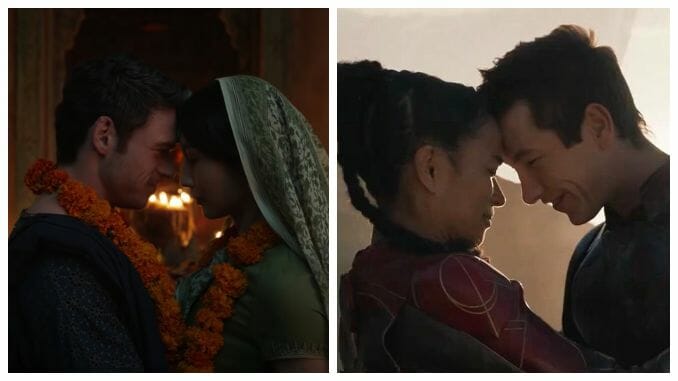The MCU’s Eternal Romance Problem

The Marvel Cinematic Universe is an astounding achievement in many ways: Comprising twenty-some films and nearly a dozen television properties, it is the entertainment behemoth that dominates our current pop culture landscape. And it likely will for some years to come, given the number of titles it has currently slated or already in production. The average moviegoer is now fluent in superhero-speak and intimately familiar with seemingly bizarre concepts like multiverses and chaos magic. In short: The nerds have fully inherited the earth. (What a time to be alive, is what I’m saying.) And yet, the MCU remains a complete failure when it comes to one of the key elements that help make comic book stories so popular: Romantic relationships.
Even though most comic fans probably wouldn’t identify themselves as “shippers” the way that movie or television viewers who watch something for a specific couple might, virtually every one of them could likely name a favorite pairing from their series of choice. Jean Grey and Scott Summers. Peter Parker and Mary Jane Watson. Sue Storm and Reed Richards. Vision and the Scarlet Witch. These relationships are all basically the definition of epic love, but they’re also precisely the kind of stories that, thus far, the Marvel film universe has most studiously ignored.
Despite its many popular-on-paper couples, romance in the MCU is largely restricted to passionless pining, occasionally culminating in a single, sweeping kiss for marquee couples like Steve Rogers and Peggy Carter or Tony Stark and Pepper Potts. Though the franchise is surprisingly good at depicting (supposedly) platonic friendship—the relationship between Steve and his brainwashed BFF Bucky Barnes is rich enough to power an entire trilogy, and Clint Barton’s grief over Natasha Romanov’s death is a big piece of the emotional engine currently driving Hawkeye—romantic interest in the MCU is predominantly indicated by the sort of snarky verbal banter and tiresome “being mean means I like you” tension that is reminiscent of boys insulting girls on the grade school playground.
The universe displays little interest in the inner workings of romantic relationships, generally counting on fans’ pre-existing knowledge to fill narrative gaps that can often span years and multiple sequels spread across several properties. Wanda and Vision’s supposedly epic love story being reduced to the plot device that powers Avengers: Infinity War’s climax—after the two fell in love off-screen—is perhaps the worst offender in this vein, but it’s hardly the only one. (Sorry to everyone who may have wanted to know how Tony and Pepper ended up on the brink of divorce in Captain America: Civil War, but are somehow back together by Spider-Man: Homecoming!)
Because of all this, WandaVision felt like a much-needed (and long-awaited) course correction. The franchise’s first real attempt at telling a love story, the show finally treated one of its most iconic couples as precisely that: A legitimate relationship worth exploring on its own merits. And the result was magical. WandaVision is thematically rich, narratively compelling and emotionally devastating, and that’s all down to the romance at its center. None of it works if we don’t see—if we can’t easily believe—that Wanda loves Vision enough to remake reality in his name. It seemed like Marvel finally understood that audiences deserved romantic connections with real depth and genuine emotion attached to them. It felt like the dawn of a whole new world.
Surely, many fans (read: me) likely thought we’d crossed the proverbial Rubicon. Marvel gets it now! We’ll never have to suffer through the blink-and-you’ll-miss-it “romance” plots that pop up throughout the franchise again! (Remember that whole Steve and Sharon Carter thing? Y i k e s.) It’s clear that other stories can exist beyond those that promise massive stakes and potentially world-ending problems. We’ll finally get to see real, complicated love stories between the characters we care about play out on-screen and see how those relationships evolve instead of just hearing about it in sequel-based exposition dumps. Maybe some of these supposed soulmates will even kiss more than once!
-

-

-

-

-

-

-

-

-

-

-

-

-

-

-

-

-

-

-

-

-

-

-

-

-

-

-

-

-

-

-

-

-

-

-

-

-

-

-

-








































